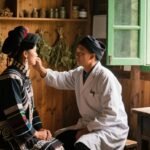Li Lianfang, the prefect of Yuzhou (equivalent to a modern-day mayor), and I had been friends since childhood, bonding over poetry and essays. After passing the provincial imperial exam (juren) in the Xinhai year, he qualified for an official post and was appointed as a prefect. While waiting for his assignment in the capital, we lived together at the Xiangling Guild Hall—a lodging house for fellow townsmen—sharing meals and daily life.
Lianfang loved hosting feasts with friends, often staying out late. Back then, coal stoves were common for winter heating, but their fumes were deadly. Combined with the cold night air, his health eventually gave out.
One midnight, I was asleep when his younger brother, Li Xiaoyuan, banged on my door: “My brother is critically ill! Please come now!” I threw on my clothes and rushed over. Lianfang lay trembling, drenched in cold sweat, writhing in bed. He complained of a crushing chest tightness, nausea, and a pounding heartbeat.
I checked his left wrist’s pulse first—nothing unusual. Switching to his right wrist, the Cun-Guan pulse positions (key diagnostic spots in Chinese medicine) felt rapid and slippery, “like a gushing spring.” I diagnosed: “This is from rich food stagnation trapped by cold wind, worsened by coal smoke inflaming phlegm.”
I immediately prescribed Er Chen Tang—a classic herbal formula for resolving phlegm—plus malt, hawthorn, fermented yeast for digestion, and scutellaria, coptis, citrus peel to clear heat. Within 30 minutes, he calmed down and slept. By 9 a.m., he rushed to the bathroom, expelling foul red-yellow waste multiple times. By afternoon, he was breathing easily and sipping porridge. Eager to join a friends’ winter gathering, he tried to hail a carriage—but I stopped him: “Already forgotten how you suffered this morning?” He laughed and stayed put.
That winter, Lianfang returned to his hometown in Shanxi, and I moved in with Xiaoyuan. One predawn, I heard urgent groans—Xiaoyuan’s symptoms and pulse mirrored his brother’s exactly! I joked, “You two truly share everything.” Using the same prescription, his recovery followed the same pattern: rapid (supports liver function) and relief.
That evening, their servant whispered to me: “Thank heavens you treated both masters. Another doctor would’ve made things worse with unnecessary complications.” Nodding in agreement, I admired the wisdom in his words.

The esteemed medical text Zui Hua Chuang Medical (Original: Ming Dynasty Clinical Archives) has been translated by timtcm.com. We welcome your valuable comments and feedback in the section below.


Leave a Reply